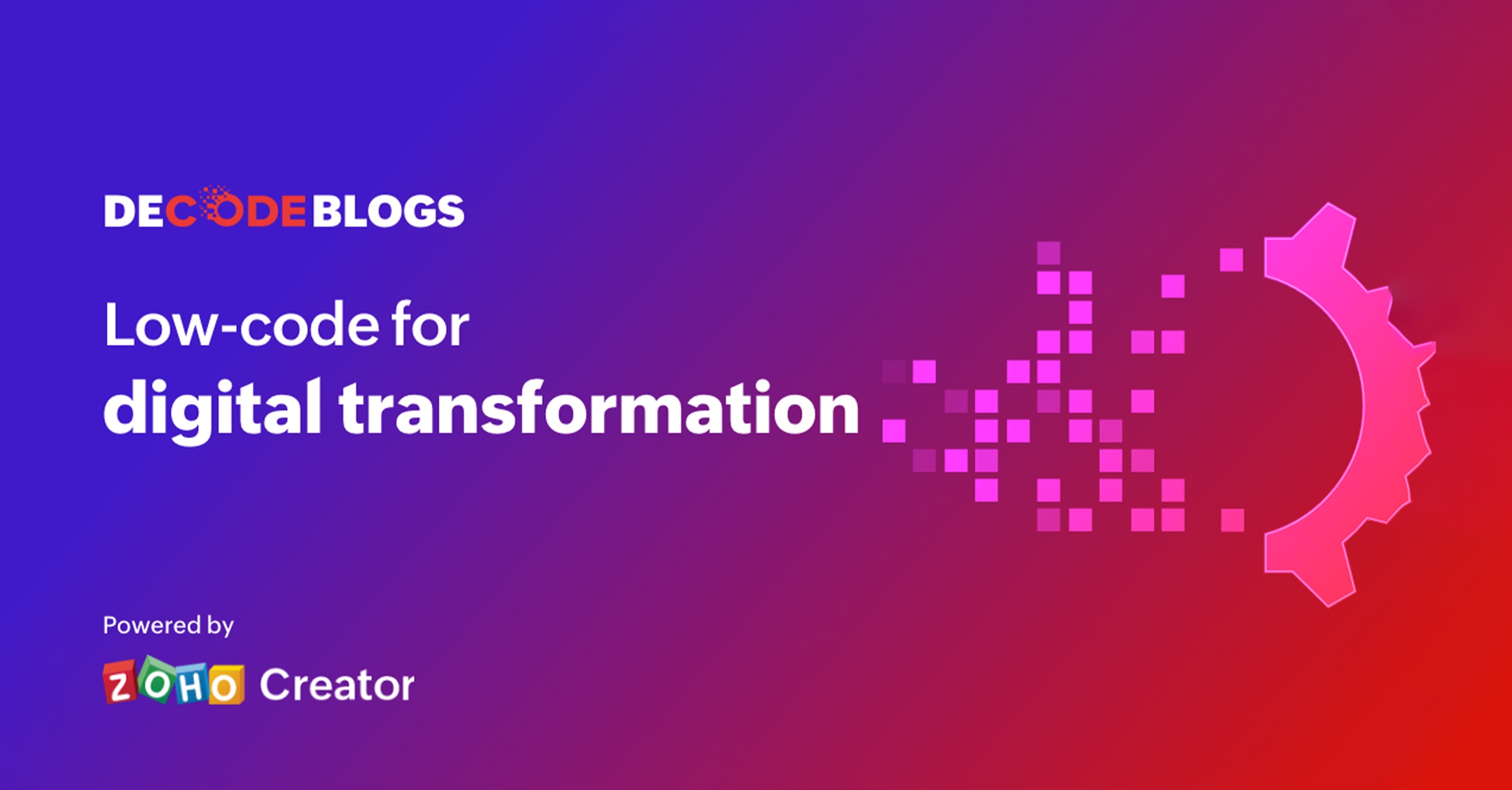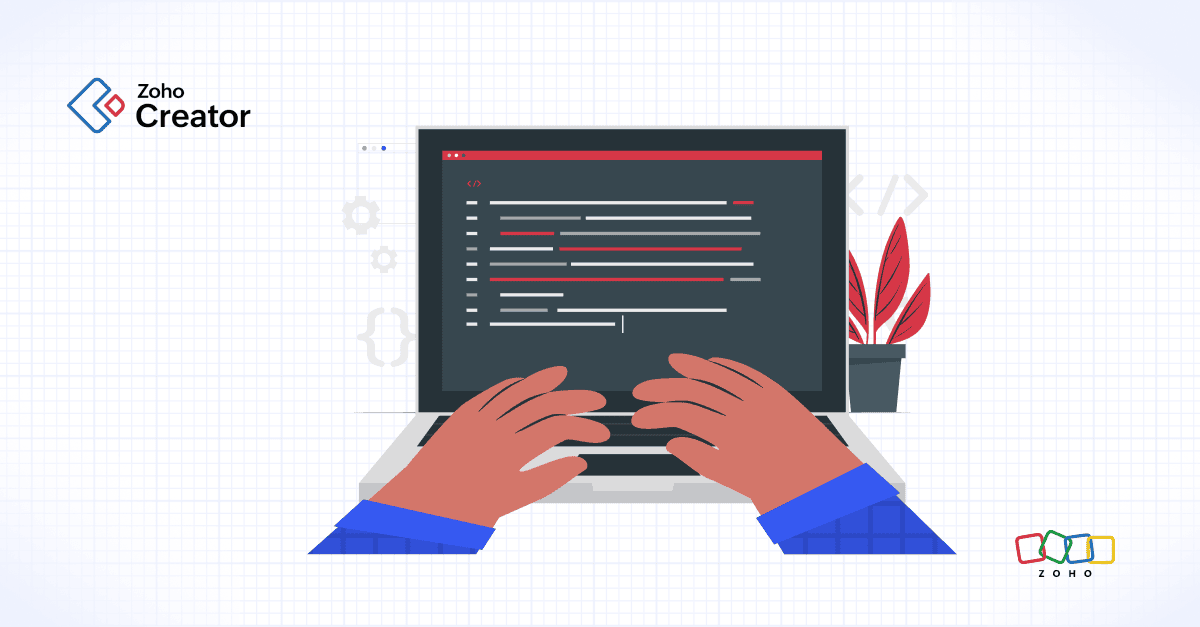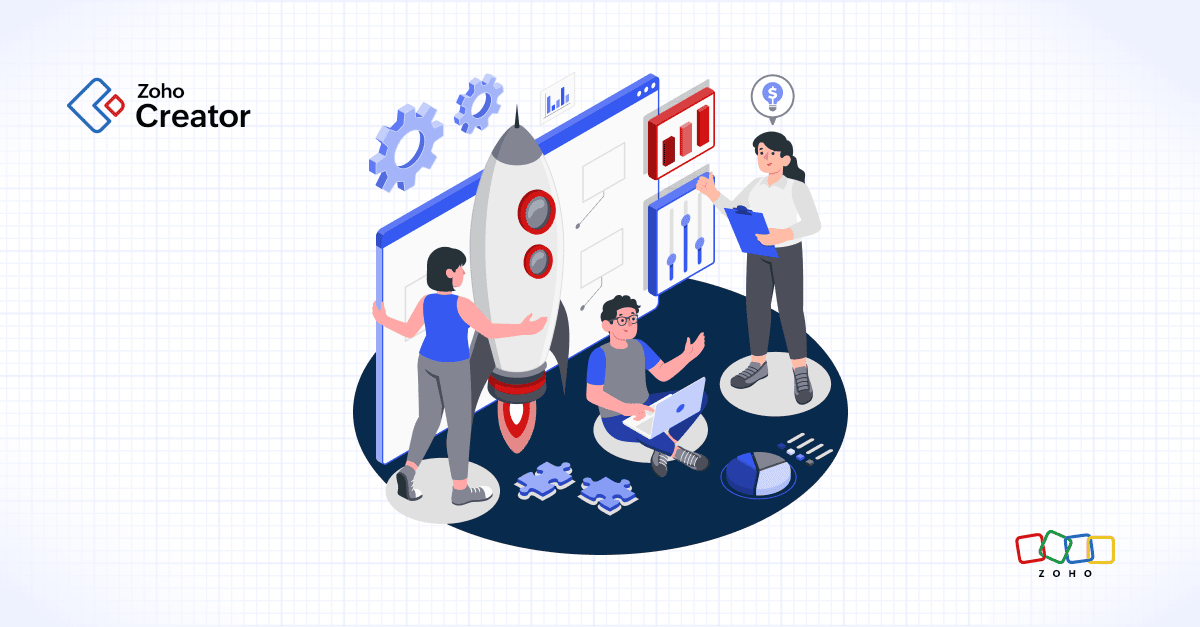- HOME
- Know Your Tech
- Low-code for digital transformation
Low-code for digital transformation
- Last Updated : April 20, 2023
- 857 Views
- 6 Min Read

Digital transformation has become essential for all businesses, irrespective of their size, industry, or function. And this demands that businesses align themselves with a well-thought-out strategy to operate with flexibility—one that's more agile and responsive to market and customer needs.
We recently had Jerry Rapp, CIO of Town Pump, who has extensively worked in the tech and software industry for over 20 years; Jason Bloomberg, President of Intellyx, who analyzes multiple disruptive trends in enterprise technology and digital transformation; and Tejas Gadhia, Lead Developer Evangelist of Zoho, who has worked closely with low-code and SaaS technology, as part of a panel to discuss how low-code plays an important role in amplifying digital transformation in enterprises. They shared many valuable insights on how organizations can transform efficiently, innovate faster, and deliver new capabilities using low-code.
Let’s take a look at the key points from the conversation.
How is low-code reshaping the digital transformation strategy of organizations?
Jason - We like to say digital transformation is software-empowered but customer-driven, where organizations are now able to transform themselves to meet customer needs better and break down organizational silos. When you break down organizational silos, you're also breaking down technological silos, so this wouldn't be possible if it wasn't for a whole range of new digital technologies, from cloud computing to better front-end technologies like HTML and enterprise applications like SaaS services. Technology has been the enabler. It doesn't matter how complex or simple it is, but at the end of the day we're trying to serve the customer better.
What are the biggest barriers to digital transformation?
Tejas - One of the biggest issues that organizations tend to have is more cultural than operational. The leadership team might say we need to go down this particular route and it's in everyone's best interest, but that sentiment isn't really believed by everybody at every level of the organization. One should have that mentality of finding ways to make things better. Then, a lot more digital transformation initiatives, whether it's process-based or just digitization or integrations, will work within the organization. Culture really has to be the number one challenge.
Secondly, I think a lot of people in recent times know a lot of software and technology that you could leverage to digitize things. It gets difficult to navigate between what's right and what's wrong when identifying what's a scalable solution, what's a cost-effective solution, and what's going to work for the business. It’s best to start small.
When you look at vendors that you'd like to partner with, especially in digital transformation, consider a vendor as not just a piece of software or an organization you're doing business with but really as a technology partner. It's important to have a close relationship with that vendor and understand what their roadmap is, what their philosophy is, and what their business record is.
The third one is going to be strategy, which is always important. If everybody is frantically looking for problems and trying to solve them on their own, without any strategy or game plan, then you end up with too many solutions or not scalable solutions, and you have to deal with security, auditing, and integration nightmares down the line. So there needs to be a couple of champions within an organization who can take everybody's ideas, digest them, and figure out what they want to prioritize and what they're going to use—and that's how they're going to solve it all at once.
How are applications playing a pivotal role in digital transformation?
Jason -Applications play a critical part in the digital transformation journey of the company—it's changing the value that technology has in the organization. And secondly, it's empowering people to change roles in their processes as part of that digitalization effort.
Jerry - From a technology standpoint, we’re going to get a variety of requests and part of our job is to understand the tools that are available and select the correct tool to take advantage of the opportunity or solve the challenge in front of you. Also, you have to be very clear when selecting these tools on how they fit into the big picture. Identifying whether it's a major puzzle piece or a small one is important.
So when we look at our data, and the structure of our data, and how it has to interact with each other, we have to select systems that will interact the best with each other so we minimize the movement of that data and the replication as much as possible. When we look at the processes, we look at the data itself and then we look at it from the overall architecture perspective. Then, we try to make the right choice and select the right tool to handle the opportunity in front of us.
How does low-code enable digital transformation?
Jerry - What's nice about low-code is the faster time to market. With traditional application development platforms, the ability to bring something into production could take weeks, if not months or longer.
What I also like about low-code is the maintenance side. Traditional development consumes more time on maintenance than you do on actual development and with low-code, it keeps the maintenance down and allows you to still continue to have more hours, labor, and money spent on application development. So you don't get into a mix where all of a sudden you're spending 70% of your waiver on maintenance and 30% on development. This allows organizations to streamline their digital transformation strategies clearly.
Tejas - The biggest takeaway from a low-code platform is the fact that it's customizable to any extent that you need, and it depends upon the platform that you're going with. Some can't handle it, but then the fact is, if you choose a good platform you'll be able to start with one process and then build on top of that, and it gives our customers the differentiation in terms of their competitors. They can customize it to extreme levels, and then drive value from that, which is the most fascinating part for me.
How can you start your digital transformation journey with low-code?
Jason - These tools have a simple learning curve, so it doesn't take much to get into it, but you still need to have a reason to do so. It's not like people at work have a lot of extra time on their hands just to play around, so there has to be some sort of initial application that's valuable and that's an excuse for one person or a small team to get up to speed on the tool. For example, process management apps are very common, as are data entry apps of various sorts, and front ends to existing enterprise or legacy apps. These are solutions where you know the app functionality is meeting your needs, but the user interface isn't, and you can often address that with a low-code tools as you explore it.
Jerry - I have had some development experience in my past roles, but when I looked at Zoho Creator, it was really an after-hours activity. It was getting a single user license and taking a look at it and becoming familiar with it, and then I took the Zoho developer course, which had four sessions and that was a great overview of reinforcing what I looked at, what I learned, and what I had read.
Understanding the application and then taking about 10 hours of the developer class, I was up and running. This takes me back to a conversation that I was having with one of our clients—it was an interview—and towards the end I asked the same question, and he said always start small and scale fast. Small use cases are great for getting the hang of it, as well as your entire team. Start from there, and then build on top of that, and try pushing the limits—that gets you started on the journey. And before you know it, it becomes much more meaningful in terms of the value it delivers and the effort you're putting into it.
Going forward
The biggest takeaway of the panel discussion for us was how the right approach to digital transformation can make all the difference in driving long-term success in organizations. If you're looking to kick-start your organizational transformation, check out the full discussion here.
You can also learn more about Jerry and Town Pump's experience with low-code and Zoho Creator, Jason's expertise on digital transformation strategies and how low-code can make it happen, and of course Tejas's take on low-code platforms and how Zoho Creator can act as an enabler for organizations that are looking to start their digitization journey.
 Merlin
MerlinMerlin is our in-house digital workplace content specialist. She spends part of her days combining her passion for writing with marketing. The rest of her time is spent reading manga, battling friends in online games, and discovering new music.




Comments(1)
I've been waiting for some new content about this, thank you.